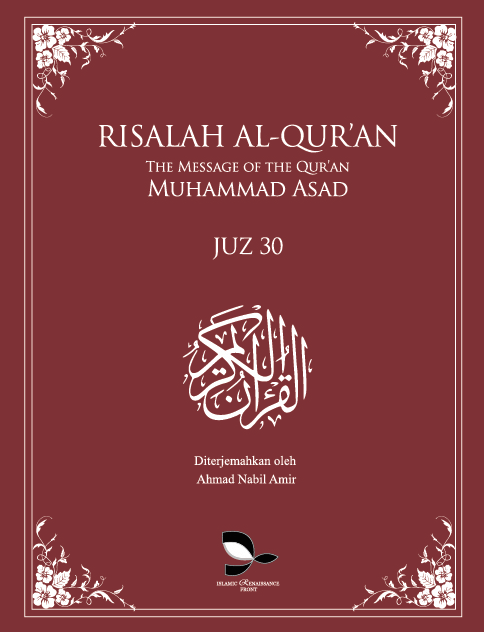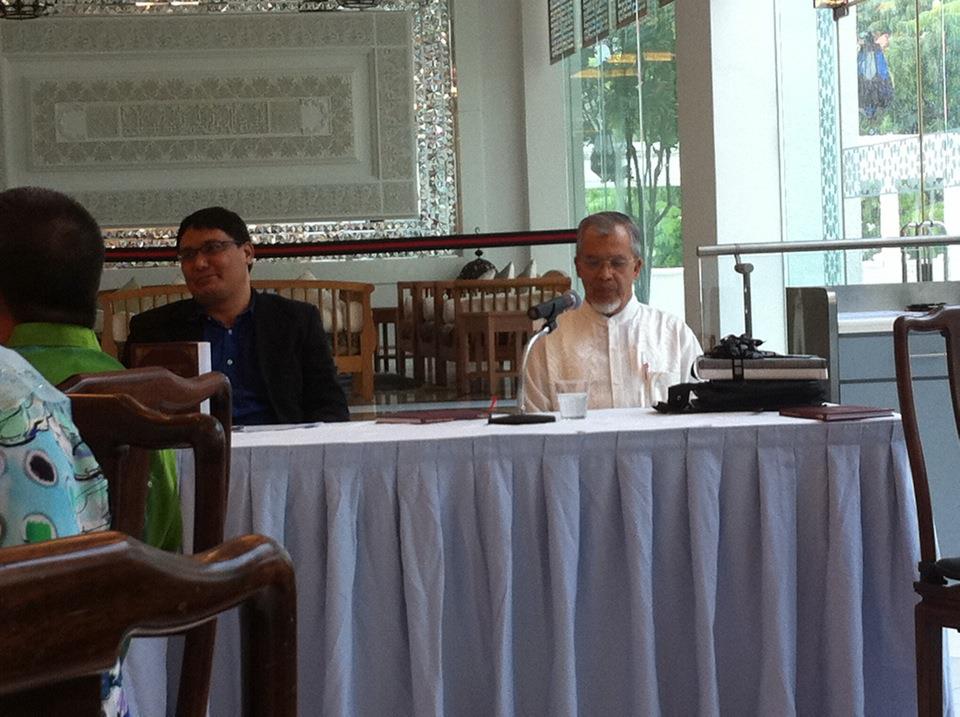 Mr Chairman, Distinguished Professor, Professor Muhammad Kamal Hassan of the International Institute of Islamic Thought and Civilization, Deans, Professors, Fellow Academicians, ladies and gentlemen.
Mr Chairman, Distinguished Professor, Professor Muhammad Kamal Hassan of the International Institute of Islamic Thought and Civilization, Deans, Professors, Fellow Academicians, ladies and gentlemen.
Assalamu’alaikum warahmatullah
Allow me to take all of you down my memory lane so that the effort in translating and presenting Muhammad Asad’s “The Message of the Qur’an” is well appreciated.
Let me start by saying that my quest to read and understand the message in the Qur’an as it was supposed to be read and understood has been a life-long journey.
I started reading the Qur’an systematically at the age of 13, at that time more because it has been a ritual for me and many of my friends who frequented the local mosque in Kelawei, Penang. Completing the entire Qur’an during Ramadan was a must and we’re competing among each other to ensure that we will complete the task before the new moon of Syawal was sighted.
I was 15 when the entire country was swept with the euphoria of the Islamic Revolution of Iran. The rejuvenated spirit at that time was so immense that not even the recent Arab Spring is comparable to how the revolution waves hit and transformed many young hearts at that time.
It was during that time that even the Islamic Party (PAS) young firebrands disposed of their existing leader and emulated the Iranian style “Vilayat-e-faqih”. The eagerness to understand the words of God was so intense at that time that I ended up buying an Indonesian translation of the Qur’an by Prof Hasbi as-Siddiqi.
It was the first Qur’an with translation that I read for the years to come and keep until today. What stimulated me to read the Qur’an intently to understand the underlying message was none other than the experience I had at Yayasan Masriyah in Bukit Mertajam when I followed a Tamrin organized by the Islamic Youth Movement of Malaysia (ABIM).
During the Tamrin, I was exposed to a very influential Islamic movement in the Middle-East, Egypt in particular: al-Ikhwan al-Muslimum (The Muslim Brotherhood). It was during this time when I was exposed to the thoughts and methodology of da’wah of al-Imam asy-Syahid Hassan al-Banna. It was then when I first learned about Ma’alim fi at-Tariq (Milestones) by asy-Syahid Sayyid Qutb.
On the first chapter of Ma’alim fi at-Tariq, Sayyid Qutb discussed about the Qur’anic generation. It was the generation of the sahabah, the companions of the Prophet. The entire premise of Milestones lies on a basic tenet of educating and motivating the potential vanguard of the re-Islamization movement. The book was written in order to re-orientate the Muslim minds in such a way that it could inspire the masses with a transformative revolutionary consciousness as inspired by the Qur’an. First and foremost was the clear spring from which the first generation of Muslims quenched their thirst.
The spring from which the companions of the Prophet drank was only the Qur’an, and only the Qur’an; as the hadith (sayings) of the Prophet were offspring of this fountainhead. The Qur’an was the only mold in which they formed their lives.
It was according to the well thought-out plan to prepare a generation pure in heart, pure in mind and pure in understanding. Their training was to be based on the method prescribed by God who gave the Qur’an, purified from the influence of all other sources.
The method described by Sayyid Qutb in creating the Qur’anic generation was similar to the method of the first generation. They read only a few verses, probably ten at most, and the they refected upon the verses and transformed their beliefs, understanding and actions according to those verses.
About the same time, I read Tafsir Surah al-Fatihah by asy-Syahid Hassan al-Banna where he strongly encouraged every Muslim to read and try to understand the Qur’an using the God given faculty. He recalled the verse: “And as for those who strive hard in Our cause – We shall most certainly guide them onto paths that lead unto Us” [al-Ankabut 29: 69]
It was then that I made it compulsory upon myself to consistently read the Qur’an every day after Maghrib prayer, at least an “’ain” or approximately ten verses and contemplate upon the meaning. I still remember, after two years of my persistent effort, at the age of nineteen, I managed to complete the entire Qur’an and the meaning finally, on one cold winter night. On that night I paused and recollected the important themes of the Qur’an.
Among the most important message that I understood, was the humane nature of the Prophet. He has no supernatural power and definitely not a supernatural being. Surprisingly this important concept was never emphasised before in my life. In Surah al Kahfi verse 110, God says: “Say [O Prophet]: “I am but a mortal man like all of you. It has been revealed unto me that your God is the One and Only God”. [al-Kahfi 18: 110]
This understanding would later turn out to be the most important premise in the evolution of my thought process in the future.
My next task was to read a more detail explanation of the texts. That was when I got acquainted with two important Tafsirs available at that time in Malay, Tafsir an-Nur by Prof Hasbi as-Siddiqi and Tafsir al-Azhar by Prof Hamka. Coincidentally, just like Hassan al-Banna, Hasbi as-Siddiqi and Hamka were both students of the greatest reformer of the 20th Century, Imam Muhammad Abduh. Reading the Tafsir was accompanied by reading dozens of books on the Sciences of Hadith and Fiqh mainly by the students of the Reformist School of Muhammad Abduh like A. Hassan, Munawar Khalil, Isa Ansari and Hasbi as-Siddiqi; to name just a few.
One of the most important principles of Abduh’s thought is the struggle to reconcile reason (‘aql) and revelation (wahy). The relationship between reason and revelation has been the most problematic issue since the early Islamic centuries.
According to Abduh, “reason” and “revelation” cannot come into conflict with one another, because religion and science are the twin sources of Islam, and that they are active in different areas.
Therefore, “reason” (‘aql) according to ‘Abduh, is the closest friend of revelation as it helps man understand the sacred texts. If man cannot use ‘aql properly, he remains incapable of showing due respect to God who created him.
A few years passed by before I stumbled across the most important interpretaion of God’s word on this matter when I read the book “Islam at the Crossroad” by none other than Muhammad Asad.
In the chapter About Education Asad clearly emphasizes that the Qur’an is full of exhortations to learn “so that you may become wise”, “that you may think”, and “that you may know”.
Asad also emphasizes on the importance of “reason” in his elaboration of the verse: “and He imparted unto Adam the names of all things”. [al-Baqarah 2: 31]
The Arabic term “ism” (name) in the verse implies according to all philologists, an expression “conveying the knowledge (of a thing). According to Asad, in philosophical terminology, it denotes a “concept”.
The subsequent verses show that owing to his God-given knowledge of those “names” or conceptual thinking, man is, in certain respect, superior to the angels.
The “names’ are a symbolic expression for the power of defining terms, the power of articulate thinking which is peculiar to the human being and which enables him, in the words of the Qur’an, to be God’s vicegerent (khalifah) on earth.
Clearly the attitude of Muslims nowadays who have the tendency to resort to literal interpretation of “texts” (nas), and refuting anything that falls within the realm of “reason” contribute to the stagnation and decaying condition of the ummah itself.
This articulation in “Islam at the Crossroads” had a very profound effect on my mind and my soul. It answers the question that I have been asking myself all these while. What was it that was so special about being a mortal being, with temptations and definitely not free from committing sins to be more superior than the ever obedient angels.
The sudden enlightenment led me to search for “The Message of the Qur’an”. It answers many difficult questions that I have regarding this religion especially on the issues of pre-destination, the doctrine of abrogation (an-nasikh wal–mansukh), whether the Qur’an is time-bound or timeless , the seemingly contradictory verses of the Qur’an with modern science and other pertinent issues. Throughout the pages of “The Message of the Qur’an”, I found the answers to the questions that have been bugging my mind.
The most precious knowledge that I gained was the reformist agenda of Muhammad Abduh was even much clearer when I read “The Message”. The main problem to many Muslims nowadays is whether Islam would find a way to devise a system between faith and modernity.
A century ago, Muhammad Abduh had argued that while certain aspects of religion would remain immutable especially those concerning ibadah (worship) and aqidah (creed) or known as ath-thawabit (the immutables), however issues of governance should be addressed through human reason since they fall under the realms of al-mutaghaiyyirat (the changing).
It was Abduh’s reformist agenda and rationalism then, with its emphasis on reason (‘aql) and God’s justice (‘adl), which seemed as if it might be able to ground a dynamic Islamic theology capable of successfully meeting the challenges of modernity.
Alas, what we see today, these promising attempts were thwarted by the rise of the literal Salafis and its ramifications.
One of the main principles of Abduh’s reform agenda is asserting a claim to “renewed interpretation” (ijtihad)” of Islamic law based on the requirements of “social justice” (maslahah) of his own era. According to Abduh, where there seems to be a contradiction between “texts” (nas) and “social justice” (maslahah), then social justice must be given precedence.
Abduh supports the principle based on the notion that Islamic law was revealed to serve, inter alia, human welfare. Hence, all matters which preserve the well being of the society are in-line with the objectives of the syari’ah and therefore should be pursued and legally recognized.
Abduh believed that independent thinking (ijtihad) would enlarge the scope of knowledge because most of the aspects of human welfare (mu’amalat) can be further elaborated with the use of reason (‘aql).
He pointed out that since fiqh means “understanding”, whoever makes a legal decision on the basis of the literal meaning of the text only, without understanding the spirit of the law (ruh al-Shari’ah) is not a jurist (faqih).
ln this regard, he re-introduced the legal maxim “inna al ‘ibrata bi al-maqasid wa al -ma’ ani wa bi alfaz wa al-mabani”- the consideration is to be given to the intentions and meanings, not to merely words and the phrases.

Consequently ‘Abduh also opposed the literal (zahiriyah) trend and understanding of the text without recourse to reason.
Abduh justified his use of ijtihad on the basis of the following Qur’anic verse: “And strive hard in God’ s cause with aIl the striving that is due to Him: it is He who has eIected you (to carry His message], and has laid no hardship on you in [anything that pertains to] religion.” [Al-Hajj 22:78].
It was this reform agenda of Muhammad Abduh that was clearly explained by Asad while interpreting the verses of the Qur’an.
Considering that the reform agenda is the “raison d’etre” of the Islamic Renaissance Front, it is our obligation then to make the intellectual basis of our organization reacheable to the majority Malay speaking Muslims in our country. We believe that as the world continues to change, and true to the spirit of reform and renewal, there is a requirement for a second look at the Qur’an and other Islamic texts.

